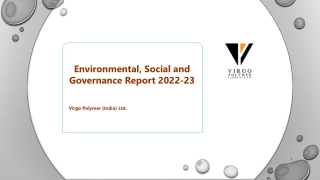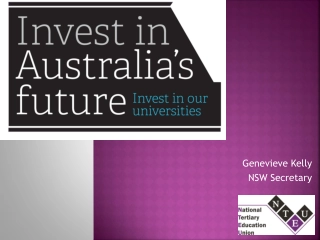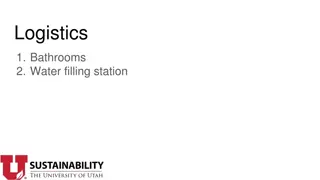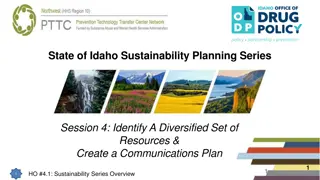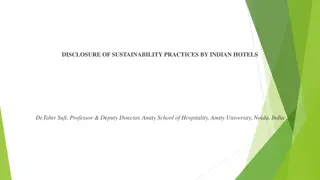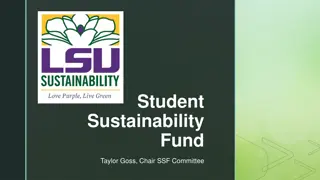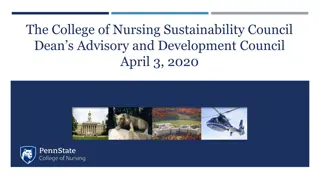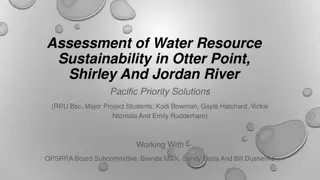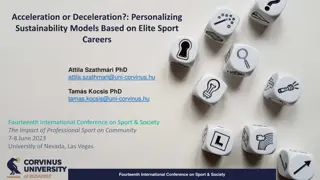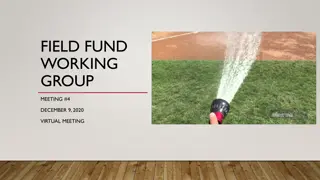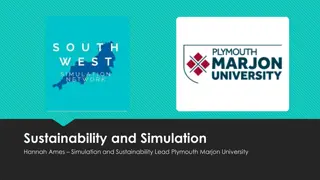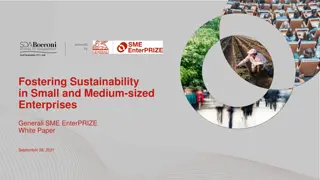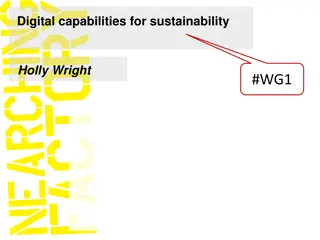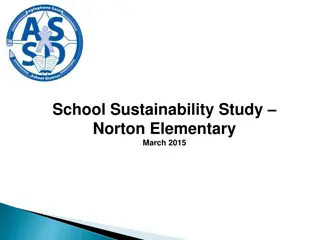Sustainability Communication as Field of Research
Assoc. Prof. Dr. habil. Franzisca Weder from the School of Communication and Arts at The University of Queensland explores the current landscape of Sustainability Communication as a research area. The lesson covers topics such as literature review, methodologies, institutionalization, future methodologies, engagement, and more. It delves into the inter/transdisciplinary approach to Sustainable Development (SD) Communication, cultural and social change, sustainability agenda, and various disciplines intersecting with Sustainability Communication.
Download Presentation

Please find below an Image/Link to download the presentation.
The content on the website is provided AS IS for your information and personal use only. It may not be sold, licensed, or shared on other websites without obtaining consent from the author. Download presentation by click this link. If you encounter any issues during the download, it is possible that the publisher has removed the file from their server.
E N D
Presentation Transcript
Sustainability Communication as Field of Research Lesson 01: Literature Review / Status Quo of a Research Area Assoc Prof. Dr. habil Franzisca Weder School of Communication and Arts The University of Queensland, Brisbane, Australia Course: Sustainability Communication produced by
Sustainability Communication SC as field of research Lesson 01: Literature Review / Status Quo of a Research Area Where are we? Episode 1: Literature review, status quo Episode 2: Methodologies used / studies Episode 3: Institutionalization of sustainability communication Episode 4: Future methodologies, engagement
Sustainability Communication SC as field of research Lesson 01: Literature Review / Status Quo of a Research Area Recap Inter- / transdisciplinary approach to SD Communication Cultural change Social change SD agenda Problem Solution Problem Solution Problem Discipline 1 Discipline 2 Discipline 3 Discipline x
Sustainability Communication SC as field of research Lesson 01: Literature Review / Status Quo of a Research Area Recap Disciplines Communication Science & Risk Communication Sustainability Communication Environmental and Social Change Communication Strategic / CSR Communication Discipline 1 Discipline 2 Discipline 3 Discipline x
Sustainability Communication SC as field of research Lesson 01: Literature Review / Status Quo of a Research Area Recap Perspectives on Sustainability Science / CC Communication: Sustainability as counter narrative (solution?) to climate change Environmental Communication: Sustainability as (moral) principle of change Sustainability as principle of restoration / regeneration CSR Communication: Sustainability as principle (moral compass) of action Sustainability as label for good behavior , used in communication
Sustainability Communication SC as field of research Lesson 01: Literature Review / Status Quo of a Research Area Recap Challenges Communication about & of environment, risk, CC, CSR Communication for transformation
Sustainability Communication SC as field of research Lesson 01: Literature Review / Status Quo of a Research Area What was needed? Media & communication perspective & theories, concepts, methodologies Science & Risk Communication Sustainability Communication Environmental and Social Change Communication Strategic / CSR Communication
Sustainability Communication SC as field of research Lesson 01: Literature Review / Status Quo of a Research Area Paradigms of Sustainability Communication Paradigms Pragmatic (communication as structure; information, education, instrumental sense of communication, functionalist/structural perspective, description of reality) how to communicate sustainability issues to others Constitutive (communication as process; symbolic action, social constructivism, sense making, define sth as problem, creates attention, evokes values, orientation, activates/stimulates engagement, exploration): sustainability communication as a process of creation of a mutual understanding of the normative concept of sustainability as well as the individual and societal possibilities of taking action (dialogue & discourse). Icon made by Raj Dev from www.freeicons.io
Sustainability Communication SC as field of research Lesson 01: Literature Review / Status Quo of a Research Area We found: Sustainability Communication Research Functionalist approach to sustainability communication Concept: Messaging Objective: Transparency Metaphor: Conduit Channels: Monological/one-directional Perspective: Seqential Constitutive approach to sustainability communication Concept: Interaction Objective: Co-creation Metapor: Connectedness Channel: Dialogical Perspective: Holistic
Sustainability Communication SC as field of research Lesson 01: Literature Review / Status Quo of a Research Area Where are we now (again ) ? Episode 1: Sustainability Communication as research field: Literature review, status quo Episode 2: Methodologies used / studies Episode 3: Institutionalization of sustainability communication Episode 4: Future methodologies, engagement
Sustainability Communication SC as field of research Lesson 01: Literature Review / Status Quo of a Research Area Learning outcomes Learning outcome 1: Describe the diverse nature of contemporary practices of sustainability communication on an individual, organizational and societal level, the relationship of strategic communication practices to other public communication practices, the role of stakeholders and publics and the communication practitioners in and outside of organizations (corporate, NGO, political and educational institutions etc.) Learning outcome 2: Develop comprehensive and well-founded knowledge in sustainability communication as field of study, an understanding of how other disciplines relate to the field and an international perspective on the field. Learning outcome 3: Understand the key elements of communication theories, strategies and tactics, and, thus, the character and operationalization of best practice sustainability communication planning frameworks. Learning outcome 4: Advance your understanding of social and civic responsibility and develop an appreciation of the philosophical and social context of sustainability communication. Advance your knowledge and respect of ethics and ethical standards in relation to communication of, about and for sustainability. Learning outcome 5: Anticipate and Interpret current issues and challenges of a world in transformation and social change. Develop a deep understanding of and skills to create change, develop advocacy, leadership and authorship in and for sustainability communication.
Sustainability Communication SC as field of research Lesson 01: Literature Review / Status Quo of a Research Area Overview Epistemic "core", paradigms Methodologies, heuristic Institutionalization (programs, journals, organizations, chairs)
Sustainability Communication SC as field of research Lesson 01: Literature Review / Status Quo of a Research Area Overview A. Research field or discipline? B. Research questions C. Existing body of knowledge D. Epistemic core ?
Sustainability Communication SC as field of research Lesson 01: Literature Review / Status Quo of a Research Area A. Research field or discipline? What is SC? Sustainability communication is a business strategy for companies who have integrated sustainability into their operational and strategic activities (Allen, 2006); it s about evidence-based strategies for making sustainability vivid, accessible, and comprehensible. (Robertson, 2019) Sustainability communication is seen as an emerging field that integrates various research approaches and practices. (Godemann and Michelsen, 2011; Cox, 2012; Anderson, 2014; Fischer et al., 2016; Weder et al., 2021a, 2021b).
Sustainability Communication SC as field of research Lesson 01: Literature Review / Status Quo of a Research Area A. Research field or discipline? 1. Particular object of research or shared object? Communication about & of Sustainability Communication for transformation
Sustainability Communication SC as field of research Lesson 01: Literature Review / Status Quo of a Research Area A. Research field or discipline? 1. Particular object of research or shared object? 2. Body of knowledge referring to the object of research / not shared? Ecological sustainability, economic opportunity, social inclusion Discourse about sustainability as communicative process within society (Ziemann, 2011) Sustainability Communication as global social process accompanied by the media; SC to advance transformation processes towards more sustainable development (Adom ent & Godemann, 2011)
Sustainability Communication SC as field of research Lesson 01: Literature Review / Status Quo of a Research Area B. Research questions asked? 1. Who communicates about sustainability? 2. What is communicated about sustainability? 3. To whom is sustainability communicated? 4. Which channels are used to communicate (about) sustainability? 5. What are the effects of sustainability communication?
Sustainability Communication SC as field of research Lesson 01: Literature Review / Status Quo of a Research Area B. Research questions asked? Most of the literature approaches communication about sustainability or communication for sustainable development (Newig et al., 2013; Genc, 2017; Weder et al., 2021). In both dimensions, the functional, instrumental understanding of communication dominates and is increasingly explained and explored (Bjorn et al., 2019; Kuntsman & Rattle, 2019) with a focus on sustainability reporting, social impact (Daily & Huang, 2001; McKenzie, 2004; chaudhuri & Jayarem, 2018) on specific media to communicate sustainability (Huang et al., 2019; Maltseva et al., 2019; Fischer et al., 2017), on dissemination strategies and pedagogical approaches (van Dam-Mieras et al., 2008; Djordjevic & cotton, 2011; Sparin & Timpson, 2012; Genc, 2017) On participatory processes / skills & capability building in environmental studies/environmental management (van de Fliert, 2021; Reed et al., 2018) Icon made by Raj Dev from www.freeicons.io
Sustainability Communication SC as field of research Lesson 01: Literature Review / Status Quo of a Research Area B. Research questions asked? Furthermore, as already explained, there is a link to the established fields of - corporate social responsibility (CSR) communication (Elving et al., 2015; Diehl et al., 2017; Golob et al., 2017; Rasche et al., 2017; Weder et al., 2019) & corporate sustainability communication (Schlichting, 2013; Lock & Seele, 2015; Signitzer & Prexl, 2007; Weder, 2012) - climate change communication (Stecula & Merkley, 2019; Nerlich et al., 2010; Sch fer, 2012; Forchtner, 2018; Sch fer & Schlichting, 2014; Kannengie er, 2020; see also: I. Neverla; M. Taddicken, M. Br ggemann) and - sustainable consumption communication (Bilharz & Schmitt, 2011; Jackson, 2014; Linea et al., 2016; Fischer et al., 2017).
Sustainability Communication SC as field of research Lesson 01: Literature Review / Status Quo of a Research Area B. Research questions asked? Questions: Dominance of: who communicates about S. to whom through which channel with what effect? Instead: What is communicated? How is it communicated? What is the nature and potential of a sustainability discourse, what about the cultural dimension? Sustainability Communication as human and technology based activity of the reciprocal use of signs and the reciprocal interpretation of signs for the purpose of successful understanding, coordinating action and shaping reality Icon made by Raj Dev from www.freeicons.io
Sustainability Communication SC as field of research Lesson 01: Literature Review / Status Quo of a Research Area C. Existing body of knowledge Growing body of knowledge in - Media & communication studies - Science communication (climate change comm., representation of S.) - Public communication (representation of S.) - Strategic communication (CSR comm, reporting, representation of S.) - Economics & marketing (consumer) research / combination with psychology (effects!) - Education / Pedagogy ( Bildung f r Nachhaltige Entwicklung) (teaching S.) - Culture / art / writing
Sustainability Communication SC as field of research Lesson 01: Literature Review / Status Quo of a Research Area C. Existing body of knowledge Cultures of sustainability We remember: discussions about sustainable development are embedded in patterns of cultural perception and action (justice, equality issues)
Sustainability Communication SC as field of research Lesson 01: Literature Review / Status Quo of a Research Area C. Existing body of knowledge Cultures of sustainability In contrast to a techno-scientific understanding of communication (which has yielded a number of complex transmission models) the social and human science description of communication begins with face-to-face contact (Ziemann, 2011)
Sustainability Communication SC as field of research Lesson 01: Literature Review / Status Quo of a Research Area C. Existing body of knowledge Communication in sustainable development Communication for sustainable development Culture of sustainability culture / communication as 4th dimension of sustainability Communication as social practice leading to transformation Sustainability discourse: reflexivity, s. as intrinsic social value, mediatization and normalization (Hammond, 2019; Soini & Dessein, 2016; Soini et al., 2015; Brocchi, 2010; Holrings, 2015; Godemann & Michelsen, 2011; 2013; Weder et al., 2021; Karmasin & Weder, 2008; Weder, 2012; Agyeman, 2007) (Spinozzi & Mazzanti, 2019; Balta Portol s & Roig Madorran, 2013; Weder, 2021; (UN, 2021; Forum d Avignon, 2014; COST Action IS1007; Weder, 2021)
Sustainability Communication SC as field of research Lesson 01: Literature Review / Status Quo of a Research Area C. Existing body of knowledge Communication in sustainable development Communication for sustainable development Culture of sustainability culture / communication as 4th dimension of sustainability Communication as social practice leading to transformation Sustainability discourse: reflexivity, s. as intrinsic social value, mediatization and normalization (Hammond, 2019; Soini & Dessein, 2016; Soini et al., 2015; Brocchi, 2010; Holrings, 2015; Godemann & Michelsen, 2011; 2013; Weder et al., 2021; Karmasin & Weder, 2008; Weder, 2012; Agyeman, 2007) (Spinozzi & Mazzanti, 2019; Balta Portol s & Roig Madorran, 2013; Weder, 2021; (UN, 2021; Forum d Avignon, 2014; COST Action IS1007; Weder, 2021)
Sustainability Communication SC as field of research Lesson 01: Literature Review / Status Quo of a Research Area C. Existing body of knowledge Communication in sustainable development Communication for sustainable development Culture of sustainability culture / communication as 4th dimension of sustainability Communication as social practice leading to transformation Sustainability discourse: reflexivity, s. as intrinsic social value, mediatization and normalization (Hammond, 2019; Soini & Dessein, 2016; Soini et al., 2015; Brocchi, 2010; Holrings, 2015; Godemann & Michelsen, 2011; 2013; Weder et al., 2021; Karmasin & Weder, 2008; Weder, 2012; Agyeman, 2007) (Spinozzi & Mazzanti, 2019; Balta Portol s & Roig Madorran, 2013; Weder, 2021; (UN, 2021; Forum d Avignon, 2014; COST Action IS1007; Weder, 2021)
Sustainability Communication SC as field of research Lesson 01: Literature Review / Status Quo of a Research Area D. Epistemic core ? Does Sustainability Communication have an epistemic core? Popularization concepts (concepts, plans be made known to the general public, offer concrete orientation for action) Innovation & alliance concepts (social, technological innovations should be initiated; variety of social actors should work together; strategic networks) Information & education concepts (content and aspects of SD need to be implemented in the education system; learn about S & develop reflexive competences) BUT: Research concepts not yet developed: interdisciplinary scientific discourse, development of own perspectives and applications needed especially for economic and political actors
Sustainability Communication SC as field of research Lesson 01: Literature Review / Status Quo of a Research Area D. Epistemic core ? Does Sustainability Communication have an epistemic core? SC: as process of mutual understanding dealing with the future development of society at the core of which is a vision of sustainability (Godemann / Michelsen, 2011) Mutual understanding on: An individual level An organizational level A societal level and: ... between individuals and institutions, between institutions and within institutions, in schools & Universities, in the media, in politics, in communities and at a regional, national and international level
Sustainability Communication SC as field of research Lesson 01: Literature Review / Status Quo of a Research Area D. Epistemic core ? Does Sustainability Communication have an epistemic core? ...not yet .. Sustainability studies and other scientific engagement with the notion of sustainable development has an interdisciplinary, as well as transdisciplinary character (Weder et al., 2019). common ground of understanding sustainability communication as introducing an understanding of the world, that is of the relationship between humans and their environment, into social discourse (Godemann & Michelsen, 2011).
Sustainability Communication SC as field of research Lesson 01: Literature Review / Status Quo of a Research Area D. Epistemic core ? Does Sustainability Communication have an epistemic core? ...not yet .. ...a critical, constructivist, cultural perspective need to be strengthened - acknowledges not only consensus as primary goal of or condition for communication, but dissensus is particularly important for the continuation of communication (every communication invites protest) - offers a way to explain the difficulty in communicating new ideas and knowledge to others - learning as intentional, self-controlled process & social learning - handling complexity - new knowledge and new experiences have to fit so that they are compatible with previous experiences and insights - risk needs to be taken into consideration - lifestyle vs. way of life - public discourses & normalization of new values
Sustainability Communication SC as field of research Lesson 01: Literature Review / Status Quo of a Research Area Reflection 1. How would you describe the status quo of research in the area of sustainability communication? 2. Which are the disciplines that deal with sustainability communication so far? 3. Which perspective on and understanding of communication is dominant in the research so far? 4. Why does it make sense to bring in a cultural, critical and rather social- constructivist perspective in communication?
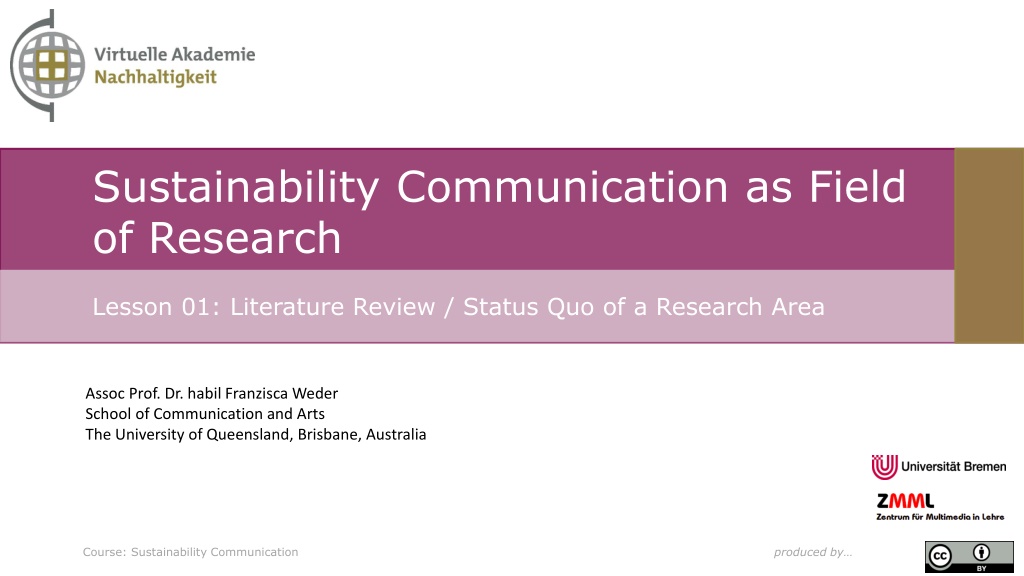
 undefined
undefined
















